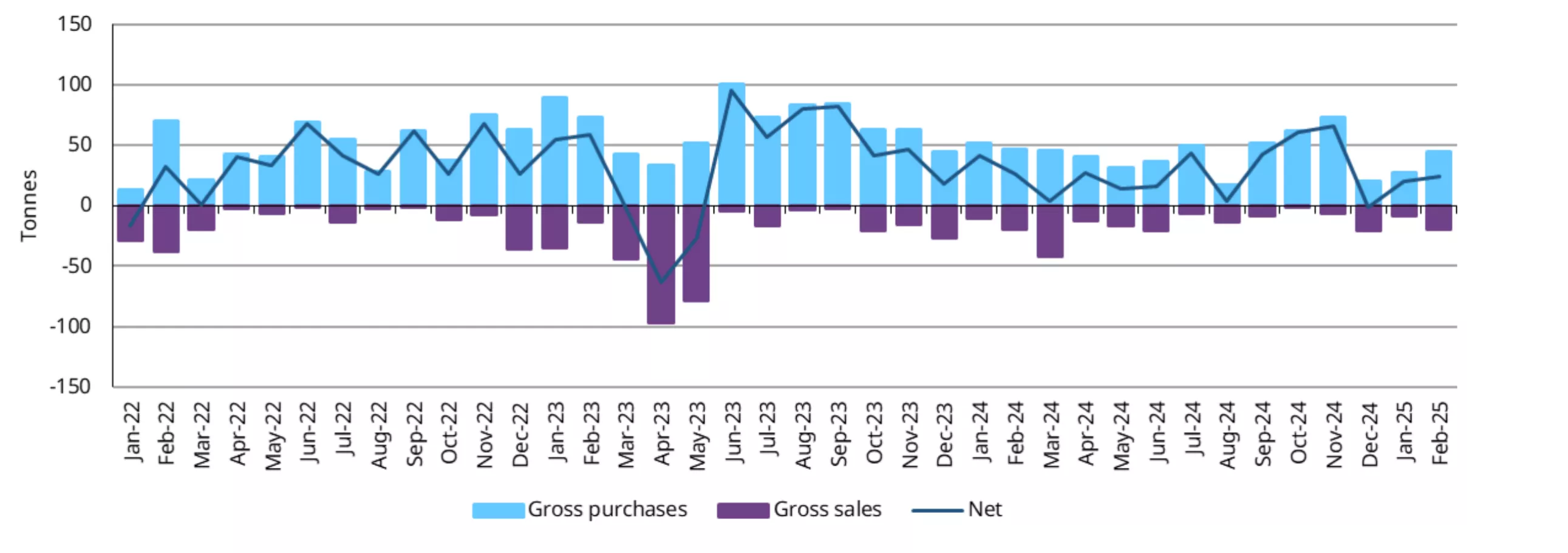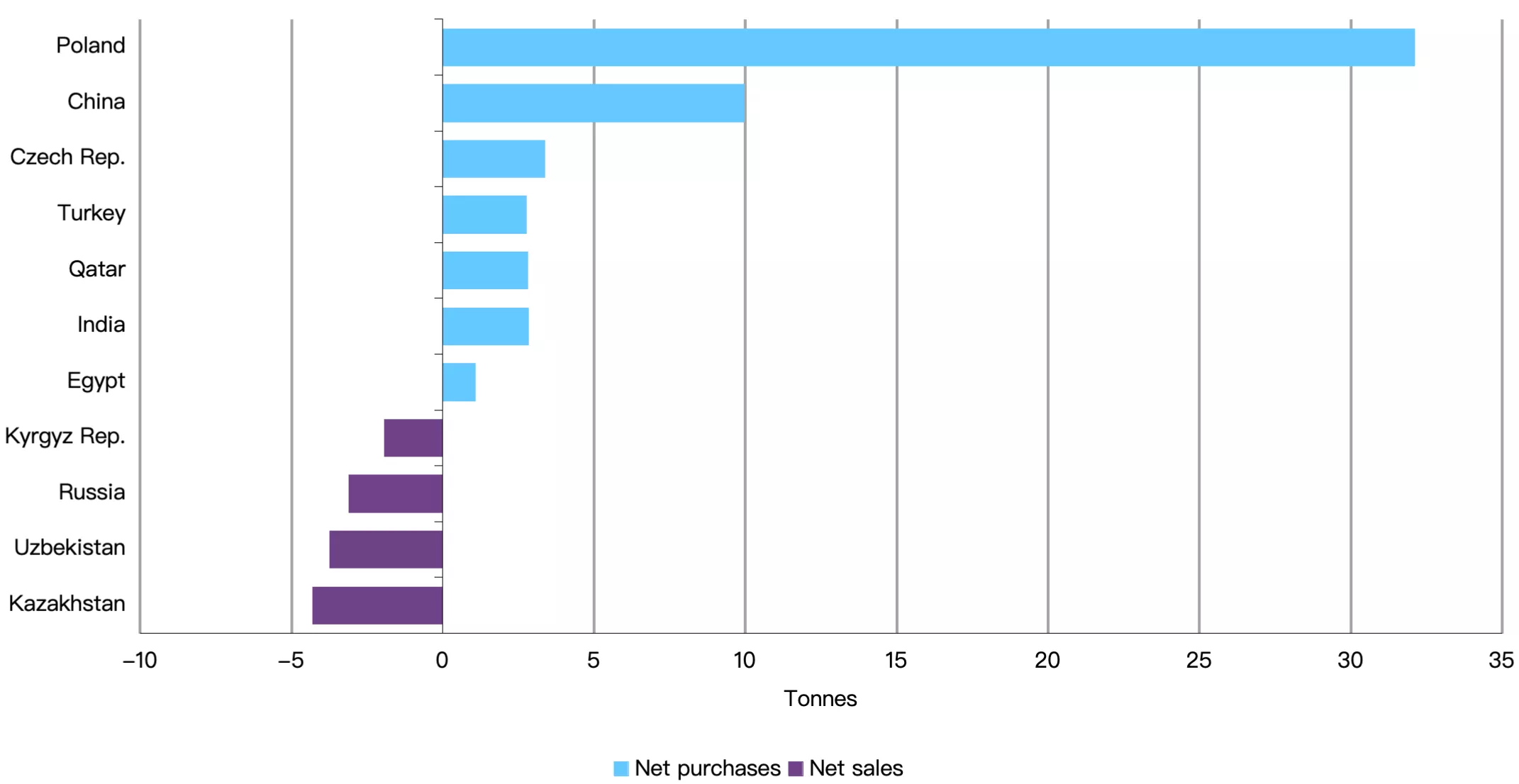Central banks keep gold in focus in February
3 April, 2025
- Central banks reported 24t net purchases in the second month of the year
- The National Bank of Poland led net purchases, adding 29t to its gold reserves, making February its 11th consecutive month of net buying
- The People’s Bank of China, the Central Bank of the Republic of Turkey, the Central Bank of Jordan, the Czech National Bank and the Qatar Central Bank also reported net purchases in February.
Demand for gold from central bankers continues, with data available for February showing reported global central bank gold reserves rising by 24t. Thus far, Poland, China, Turkey and the Czech Republic have led gold demand from emerging market central banks.
Chart 1: Official gold reserves rose by a further 24t in February
Monthly reported central bank activity, tonnes*

*Data to 31 March 2025 where available.
Note: The chart includes only purchases/sales of 0.5t or more.
Source: IMF IFS, respective central banks, World Gold Council
As in the preceding months, much of the buying was centred on those central banks that have been regular buyers/sellers of late:
- National Bank of Poland (NBP) lead month and year-to-date net buying, adding 29t in February alone. Year-to-date, NBP added 32t of gold, with its total gold holdings now 480t or 20% of its total reserves
- People’s Bank of China (PBoC) added 5t of gold in February, its fourth consecutive month of net buying since it resumed reporting in November 2024
- The Central Bank of the Republic of Turkey added 3t of gold in February, with its gold reserves totalling 623t or 38% of its total reserves
- The Central Bank of Jordan also added 3t of gold in February, with total gold reserves now at 72t or 30% of total reserves
- Qatar Central Bank reported 2t of net buying in February; its total gold holdings now stand at 114t which constitutes 19% of total reserves
- Czech National Bank added 2t of gold to their reserves this month, its gold holdings stand at 55t or 3% of total reserves
- Net sellers for the month of February were the National Bank of Kazakhstan (-8t) and the Central Bank of Uzbekistan (-12t). Both central banks lead net selling activity year-to-date, down 4t
- Despite net sales y-t-d, gold reserves form 54% of Kazakhstan's total reserves, bringing its total to 280t.
The National Bank of Belgium (NBB) has addressed recent media reports on the monetisation of Belgium’s gold reserve for public finance purposes, particularly defence spending. In a recent press release, NBB reaffirmed its independence and said gold reserves constitute assets allocated for achieving “public interest tasks entrusted to the Bank.”
Chart 2: Central banks' appetite for gold continues in February 2025
Y-t-d central bank net purchases and sales*

*Data to 31 March 2025 where available.
Note: The chart includes only purchases/sales of 0.5t or more.
Source: IMF IFS, respective central banks, World Gold Council
The year has had a decent start as central banks’ appetite for gold continues to be robust. Our upcoming Gold Demand Trends report scheduled for publication on 30th April, covering central bank demand for the entire first quarter.
Disclaimer
Important information and disclaimers
© 2025 World Gold Council. All rights reserved. World Gold Council and the Circle device are trademarks of the World Gold Council or its affiliates.
All references to LBMA Gold Price are used with the permission of ICE Benchmark Administration Limited and have been provided for informational purposes only. ICE Benchmark Administration Limited accepts no liability or responsibility for the accuracy of the prices or the underlying product to which the prices may be referenced. Other content is the intellectual property of the respective third party and all rights are reserved to them.
Reproduction or redistribution of any of this information is expressly prohibited without the prior written consent of World Gold Council or the appropriate copyright owners, except as specifically provided below. Information and statistics are copyright © and/or other intellectual property of the World Gold Council or its affiliates or third-party providers identified herein. All rights of the respective owners are reserved.
The use of the statistics in this information is permitted for the purposes of review and commentary (including media commentary) in line with fair industry practice, subject to the following two pre-conditions: (i) only limited extracts of data or analysis be used; and (ii) any and all use of these statistics is accompanied by a citation to World Gold Council and, where appropriate, to Metals Focus or other identified copyright owners as their source. World Gold Council is affiliated with Metals Focus.
The World Gold Council and its affiliates do not guarantee the accuracy or completeness of any information nor accept responsibility for any losses or damages arising directly or indirectly from the use of this information.
This information is for educational purposes only and by receiving this information, you agree with its intended purpose. Nothing contained herein is intended to constitute a recommendation, investment advice, or offer for the purchase or sale of gold, any gold-related products or services or any other products, services, securities or financial instruments (collectively, “Services”). This information does not take into account any investment objectives, financial situation or particular needs of any particular person.
Diversification does not guarantee any investment returns and does not eliminate the risk of loss. Past performance is not necessarily indicative of future results. The resulting performance of any investment outcomes that can be generated through allocation to gold are hypothetical in nature, may not reflect actual investment results and are not guarantees of future results. The World Gold Council and its affiliates do not guarantee or warranty any calculations and models used in any hypothetical portfolios or any outcomes resulting from any such use. Investors should discuss their individual circumstances with their appropriate investment professionals before making any decision regarding any Services or investments.
This information may contain forward-looking statements, such as statements which use the words “believes”, “expects”, “may”, or “suggests”, or similar terminology, which are based on current expectations and are subject to change. Forward-looking statements involve a number of risks and uncertainties. There can be no assurance that any forward-looking statements will be achieved. World Gold Council and its affiliates assume no responsibility for updating any forward-looking statements.
Information regarding QaurumSM and the Gold Valuation Framework
Note that the resulting performance of various investment outcomes that can be generated through use of Qaurum, the Gold Valuation Framework and other information are hypothetical in nature, may not reflect actual investment results and are not guarantees of future results. Neither World Gold Council (including its affiliates) nor Oxford Economics provides any warranty or guarantee regarding the functionality of the tool, including without limitation any projections, estimates or calculations.
